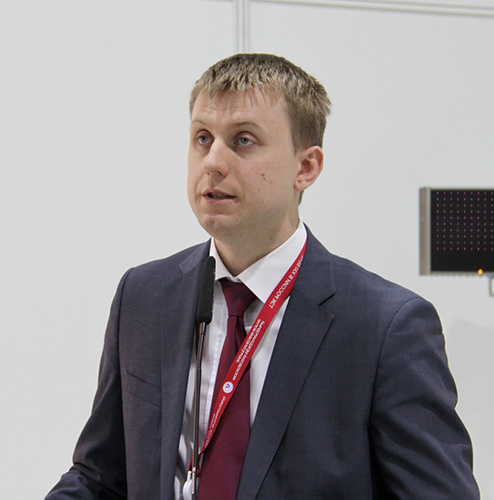Light Line
8 800 220-0-220 Contact CenterJSC “MOESK” Has Organized Round Table on Prospects of Electric Transport Development in Russia
We are open to cooperation and ready to offer information materials to journalists on the issues of the Company’s activity, help to arrange comments and interview with managers and leading specialists of PJSC “Rosseti Moscow Region”.
11.04.2013
A round table on “Prospects for development of electric transport in Russia: engineering features of charging infrastructure creation" organized by JSC “MOESK” on the initiative of the Federal Grid Company (JSC “UES FGC”) became, without doubt, the most important event of the first day of the Moscow International Energy Forum “Fuel and Energy Complex of Russia in the XXI Century” (MIEF-2013).
Opening the round table, Roman Berdnikov, First Deputy Chairman of JSC “UES FGC” emphasized importance of creation of the charging infrastructure for the electric market formation in Russia. In the U.S.A., according to the speaker, nearby 150 charging plants are implemented monthly. Russian program of the charging infrastructure development is intended to solve the problem. It was designed to meet the world trend of introducing electric transport and role of companies of the electric grid complex in creation of the charging infrastructure.
Structurally, the program includes three main stages. The main task during the first phase which is scheduled for 2013 - 2014 is development of technological solutions in the charging infrastructure. The second phase (2014 - 2015) supposes creation of the charging infrastructure in key regions, which include Moscow and the Moscow Area, Stavropol Territory, Yekaterinburg. After 2015, when the third phase starts, Russia's million cities will become centers of creation of the charging infrastructure on the basis of the existing electric grid complex.
 Denis Tsypulev, Deputy Head of the Directorate for Development, Information Technologies and Operational Efficiency of JSC “MOESK” dwelled on the lessons of the research project “MOESK-EV”, which is associated with creation and testing of Russia’s first network of charging stations for electric vehicles. He shared some of the methods of research, tested during the project, as well as interesting conclusions. It turns out that the value of kilometers travelled by the electric vehicle using one charge is attributable to not so much the weather and road characteristics of Russia, but the experience of a driver, his/her manner of driving. Experienced drivers who have already joined MOESK manage to travel more kilometers using one charge than stated in the technical documentation of the auto manufacturer.
Denis Tsypulev, Deputy Head of the Directorate for Development, Information Technologies and Operational Efficiency of JSC “MOESK” dwelled on the lessons of the research project “MOESK-EV”, which is associated with creation and testing of Russia’s first network of charging stations for electric vehicles. He shared some of the methods of research, tested during the project, as well as interesting conclusions. It turns out that the value of kilometers travelled by the electric vehicle using one charge is attributable to not so much the weather and road characteristics of Russia, but the experience of a driver, his/her manner of driving. Experienced drivers who have already joined MOESK manage to travel more kilometers using one charge than stated in the technical documentation of the auto manufacturer.The research theme was taken up by Dmitry Samatov, Minister of Industry and Energy Sector of the Stavropol Territory, and Mikhail Osorin, Director General of LLC “Revolta”. The first speaker described the pilot project performed in Kislovodsk to implement eco-taxi on the basis of domestic electric car “Ellada”. The head of “Revolta” emphasized the innovative products created during the project “MOESK-EV”: software system to manage the network of charging stations and the first national charging station.
New projects in the charging infrastructure implemented in the U.S.A. and Europe were covered by Nikolai Grachev. He stressed that the amount of sold electric vehicles and plug-in hybrids in the world has a strong tendency to increase. Over the last year it has doubled, and the operating mode of charging stations reached 30%. By 2020, according to various estimates, the share of sales of electric vehicles and plug-in hybrids will be from 3 to 10% of all cars sold.
The prospects for creation of new models of electric cars and their output to the Russian market were the subject of presentations by Andrey Pankov, Chief Executive Director of LLC “Rolf Import” - the official distributor of the Japanese auto concern Mitsubishi. According to A. Pankov, the Japanese automaker is preparing to release a line of electric vehicles, which are characterized by high technical and environmental characteristics. One of them is an electric off-road vehicle Mitsubishi Outlander PHEV with the power reserve of 880 km will be delivered to the European car markets this summer.
The only foreign speaker Zlatitsa Rozpravkova, director of the plant “SOR Libchavy” told about Czech experience in operating electric buses. The theme was taken up by Maxim Karov, Director for marketing of the division “Buses” in GAZ Group. According to him, the electric buses market capacity will be nearby 20 thousand units by 2018. The need for a new type of transport dictates the need for appropriate charging infrastructure.
The volume of digital material and facts delivered by the roundtable participants provides the basis for an optimistic forecast regarding implementation of All-Russian program of the charging infrastructure development. Moscow United Electric Grid Company plays the role of the main co-contractor in Moscow and the Moscow Area, where more than 2,200 charging stations can be installed, including 310 sets of rapid charging, as well as technologies of ultra-fast charging of electric buses can be developed and implemented, which will replace diesel buses and trolleys.